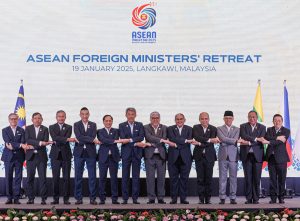Southeast Asian leaders have warned Myanmar’s military regime that it should prioritize peace over an election planned for later this year, saying that the latter must “involve all stakeholders.”
At the Association of Southeast Asian Nations (ASEAN)’s Foreign Ministers’ Retreat in Langkawi over the weekend, the region’s foreign ministers called on the various sides to Myanmar’s conflict to put down their guns and told a representative of the military junta to permit unhindered humanitarian access, Malaysia’s Foreign Minister Mohamad Hasan said on Sunday.
Addressing a post-meeting press conference, Hasan said that a representative of Myanmar’s military junta had briefed the gathering about plans to hold an election this year, but that the rest of ASEAN’s member states want to ensure peace before any polls are held.
“We said the election has to be inclusive. The election cannot be in isolation, it has to involve all stakeholders,” he said, the Associated Press reported. “We told them the election is not our priority. Our priority is to stop the violence.”
Hasan added that Malaysia had appointed Othman Hashim, a former senior official in the Malaysian Foreign Ministry, as the bloc’s special envoy to Myanmar for 2025. He will now pick up where his three predecessors left off, and engage various factions in a bid to find a way forward, in line with the bloc’s Five-Point Consensus peace plan. Mohamad said Othman would visit Myanmar “soon.”
The foreign ministers retreat, the first major meeting of the 10-member Association of Southeast Asian Nations (ASEAN) this year, offered a preview of how Malaysia will address the Myanmar conflict as chair.
The conflict has posed a severe challenge to the Southeast Asian bloc. ASEAN’s Five-Point Consensus peace plan, formulated at a special meeting in April 2021, calls for an immediate cessation of violence and “inclusive dialogue” involving “all parties” to the country’s conflict. But Myanmar’s military junta has refused to heed the injunction to stop its attacks on resistance forces, let alone engage in political negotiations with them.
Instead, it has pressed forward with its long-standing plans to hold an election as the prelude to an escape-hatch transition back to “civilian” rule: i.e. a form of military rule behind a civilian façade. The election plans have an element of unreality about them: after more than a year of reverses on the battlefield, the junta has lost control of large swathes of territory, including large stretches of its borders with India, Bangladesh, and China, to resistance forces. At the same time, the junta has banned dozens of political parties, ensuring that whatever election it manages to administer will be partial, illegitimate, and hotly contested.
However, the election plans have received strong backing from China’s government, which views them as a possible means of resolving (or at least freezing) the country’s current conflicts and restoring the stability necessary to secure its economic and strategic interests in Myanmar.
The meeting came a day after the military junta signed a ceasefire with a major armed rebel group in northern Shan State during China-mediated peace talks. The ceasefire agreement was signed by the junta and Myanmar National Democratic Alliance Army during their seventh round of peace talks in Kunming, state media reported yesterday.
A “formal ceasefire agreement took effect at 00:00 on Jan. 18, Beijing time, leading to an immediate cessation of hostilities,” Foreign Ministry spokeswoman Mao Ning told a briefing in Beijing. “Both the sides expressed gratitude to China for its efforts in facilitating the successful outcome of the talks,” Mao added.
While it is good that ASEAN is pressing the military junta to prioritize ending Myanmar’s conflict over its quixotic election plans, it is unlikely to do much to sway the military administration. In the nearly four years since the coup of February 1, 2021, ASEAN’s consensus-based decision-making and its policy of non-interference in the affairs of member states have left it with few options for pushing the junta to implement the Five-Point Consensus. (This weekend’s retreat reaffirmed the bloc’s decision to bar Myanmar’s ruling generals from their summits, but that has had a seemingly scant impact on the junta.)
There is currently no certainty that the military council will be able to hold its planned election; after all, the security situation in the country has already forced it to delay it repeatedly. But otherwise, there are no indications that the military will significantly change the scope of its elections at ASEAN’s urging. The unanswered question coming out of the meeting is how many ASEAN member states, if not ASEAN as a whole, will choose to provide support for the election if and when it is held.

































